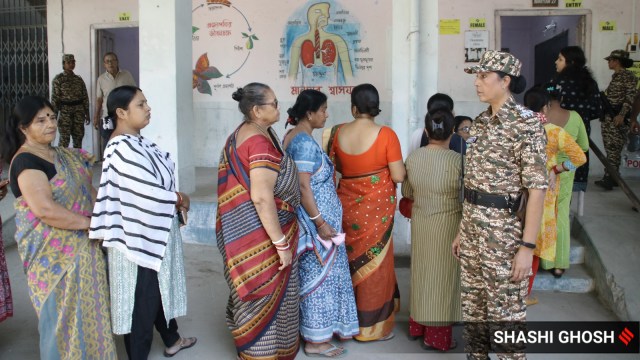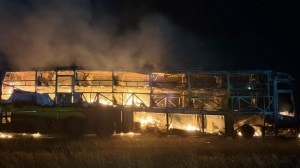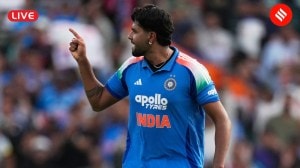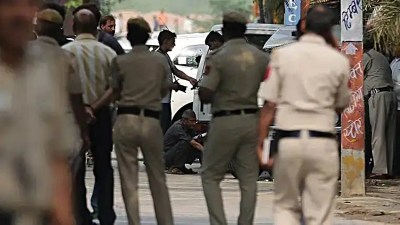The Supreme Court on Friday refused to direct the Election Commission of India (ECI) to publish the booth-wise numbers of voter turnout and upload copies of Form 17C (which reflects the votes polled in each polling station) on its website within 48 hours of polling, saying it cannot do so in the midst of elections and adjourned the hearing on pleas.
A bench of Justices Dipankar Datta and Satish Chandra Mishra, which took up an interim application filed by NGO Association for Democratic Reforms (ADR), said the interim relief which was being sought for was the same as the final relief prayed for in a pending 2019 petition by TMC leader Mahua Moitra and giving the interim relief would amount to granting the final relief.

It said all pleas in this regard will be listed before an appropriate bench to be taken up once the court reopens after summer recess.
Story continues below this ad
“…everyone is for a free and fair election…We cannot interrupt something. To take it further, we can do it. We are also responsible citizens. Let us trust some authority. We will keep it pending and will be heard along with the writ petition after the elections are over. In between elections, hands off attitude has to be there,” said Justice Datta.
The bench sought to know why the petitioner who moved the court in 2019 had not done anything to pursue the matter and ensure that it is heard in the last five years or before the current Lok Sabha elections started.
“You filed this petition in 2019. For the last five years, leave aside the Covid period, what steps were taken to have this heard? And why did you not come up with this application prior to March 16? Why on 26th of April April, when the process is on?” asked Justice Datta.
Senior advocate A M Singhvi appearing for Moitra said it was filed by a person with whom she had a relationship. “He was an advocate. She could not get the files back to move it”.
Story continues below this ad
The bench also quizzed the petitioners about the similarity of the prayers in the interim application and 2019 writ petition.
“Prayer A in your application is the prayer B in your petition. That’s the final relief you have prayed for in the writ petition. How can you claim an interim relief? Interim application is based on certain press notes pertaining to the 2024 elections. If subsequent events can be considered by the court to avoid multiplicity of proceedings, what is the procedure for that? Today, if a suit is filed and during the pendency of the suit, there are certain subsequent developments and the court feels that these developments should be taken into consideration for avoiding future litigation, what is the procedure that is adopted in the suit? And what follows in a writ petition where the principles of Civil Procedure Code apply?” asked Justice Datta.
The judge continued, “does the court grant by way of an order grant interim relief which is in the nature of final leaf, keeping the repetition pending?”
Justice Datta said “this could have given you the ground for filing a fresh repetition. Why did you not file a fresh petition? What is the nexus between the 2019 petition and 2024 application? If you say that there is a nexus, you are trapped in one way. You cannot by an interim application seek an order, you have to get your writ petition amended…And if you say there is no connection, then a fresh writ petition should have been filed.”
Story continues below this ad
Senior advocate Dushyant Dave appearing for the NGO Association for Democratic Reforms (ADR), which filed the application seeking interim relief, said it was not an adversarial litigation and that he is pained by ECI treating it so “to damn us”.
The bench, however, continued with its line of questioning. “When this is your final relief claimed in the writ petition, which is awaiting a decision, how can you expect an interim order on the same terms? asked the judge.
He said the court can grant such relief, but only in “very exceptional cases where the non-grant of an interim relief which is in the nature of final relief has the effect of rendering the proceedings infructuous”.
Dave said ADR came to the court now as the details of the voter turnout were published now. “Undisputedly after the two phases, the Election Commission itself, revised the percentage of voting. That is why we came. Not for any other reason,” Dave said.
Story continues below this ad
Justice Datta pointed out that the writ petition prayers for issuing an appropriate writ, order or direction directing the Election Commission to provide the information in public domain for the 2019 Lok Sabha elections and for all future elections.
“The Supreme Court is yet to decide on your petition and grant this relief. The matter is pending for decision. You want an interim order on the same terms. under what law?” asked Justice Datta.
Dave said that this being a Public Interest Litigation (PIL), the strict rules of procedure, pleadings, etc, do not apply.
Justice Datta, however, responded, “we are not strict on PILs if it involves a public cause. But over the years, the public interest litigation jurisdiction…of the matter that we entertain, that come before us, how many PILs have private interest, publicity interest, paisa interest. So, therefore, it is for us to put a check on frivolous writ petitions from being filed. We don’t say that on merits you don’t have a good case. You may succeed in your 2019 petition. We are trying to say is given the frame of your petition, you may not have approached at the appropriate stage with a proper prayer.”
Story continues below this ad
Dave said he understands the court’s anguish to which Justice Datta responded, “It’s not a question of anguish. Everyone is for a free and fair election. If you see the part of my judgment (on petitions seeking 100 per cent verification of VVPAT slips with the EVM votes), you will find whatever improvement is required, has to be done. And that was the point which came from the court itself. It was not pleaded”.
The court, while keeping the application and petition pending till after the elections, said it is concerned that there could be mischievous people taking advantage.
“We cannot interrupt something. To take it further, we can do it. We are also responsible citizens. Let us trust some authority,” said Justice Datta.
Appearing for the Election Commission, senior advocate Maninder Singh contended the NGO had suppressed the fact the issue of Form 17 c was settled by the SC in its judgement on EVM-VVPAT matter. He also said the application was “only founded on suspension and apprehension” and urged the court to dismiss it.









